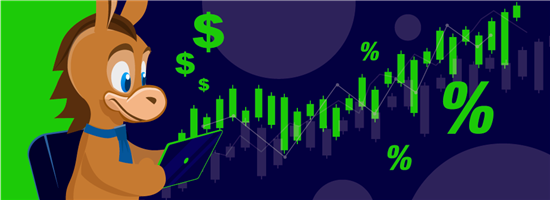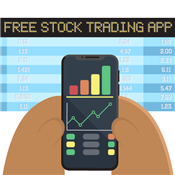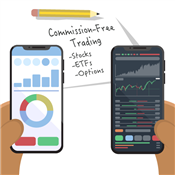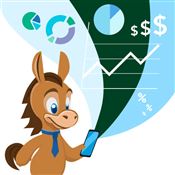How Does Robinhood Make Money
Robinhood earns money through payment for order flow, interest rates, and subscriptions. Learn how these factors contribute to Robinhood's success.
 |
Are you a Robinhood user enjoying the perks of commission-free trading? With its intuitive interface and widespread accessibility, the platform has already captivated over 11 million monthly active users.
But Robinhood's influence extends beyond convenience. Its commission-free approach has transformed the trading industry. Many platforms that adopted its model have seen their trading volume go up.
So, the million-dollar question: What's Robinhood's secret?
Prepare for a deep dive to see how Robinhood makes money and keeps itself financially stable. Let's explore its various sources of revenue.
How Robinhood Makes Money
Robinhood makes money mostly from payment for order flow. Instead of sending your market order directly to the stock exchange, Robinhood bundles it with other orders and sends them to market makers. In return for executing the trades, market makers pay Robinhood a commission or rebate.
Robinhood also offers a monthly subscription for margin trading through Robinhood Gold. There are also interest rates from securities and stock loans. The platform also generates additional revenue by depositing excess funds of users in a bank. This offers a higher interest rate.
Let's learn how each of these revenue streams works.
- Transaction-based revenue: It includes rebates from payment for order flow and other fee charges[1] on bank-to-platform transactions.
- Net interest revenue: Interest from margin trading and security and stock loans.
- Other sources of revenue: Robinhood Gold subscription and interchange fee.
5 Ways Robinhood Makes Money
Robinhood makes money through payment for order flow, Robinhood Gold subscription, margin interest and stock loan, cash in brokerage account, and interchange fees.
- Payment for Order Flow (PFOF)
When you trade stocks on Robinhood, your orders are sent to different market makers instead of going directly to the stock exchange. In return, these market makers pay Robinhood a commission or rebates for executing the trades.This model is a significant part of Robinhood's overall revenue. It accounts for almost 50%. This is why Robinhood is able to offer commission-free trading to its users.
Payment for Order Flow[2] is common among brokerage firms like Charles Schwab. Its transparency issues are also being addressed. The Securities and Exchange Commission (SEC) has stepped in and now requires companies to report the fees and commissions they receive from HFT firms. The SEC also asks for details on how the trades are actually executed to ensure fairness and proper oversight.Robinhood Crypto has also teamed up with other crypto trading platforms to give you better prices when you trade. It gets rebates based on how much people trade through these crypto platforms. This helps make your trading experience better.
Robinhood receives a rebate of $0.35 for every $100 worth of cryptocurrency trades made since May 13, 2022.[3]
- Robinhood Gold Subscription
Investors can access a range of useful tools by subscribing to Robinhood Gold. But a monthly fee of $5 must be paid to use these features.[4]The exclusive features include Morningstar research reports and NASDAQ Level II Market Data. In addition, subscribers can take advantage of benefits like larger instant deposits and no interest for the first $1,000 of margin borrowed.
Robinhood Gold
- Professional Research
- First $1,000 of margin borrowed is interest-free
- Bigger Instant Deposit
- Level II Market Data
- Margin Interest and Stock Loan
When investing on margin, you are borrowing money from Robinhood Securities. Margin rates will vary based on a customer's margin balance, ranging from 4.7% to 5.75%. - Cash in Brokerage Account
Robinhood Securities earns money on the cash you have in your brokerage account. This is cash not currently invested. Or it can also be the cash that isn't swept to the brokerage cash sweep network of program banks.Robinhood takes the cash it receives from its users and deposits it into bank accounts that offer higher interest rates. In exchange for selecting these specific banks for the cash deposits, Robinhood receives commissions from the banks.
- Interchange Fees
When you make payments using the Robinhood Cash Card, Robinhood makes money through interchange fees, which are transaction fees charged to merchants by credit card networks.Additionally, both Robinhood Securities and Robinhood Financial receive fees from program banks when funds are transferred and stored in those banks for safekeeping.
Interchange fees are common among card issuers and help cover transaction processing and fraud protection costs. It's important to remember that the Robinhood Cash Card issued by Sutton Bank is available alongside a Spending account provided by Robinhood Money, LLC.
Now, let's see where Robinhood is good at and where it still needs improvement.
Robinhood Pros and Cons
Here are the strengths and weaknesses of Robinhood.
|
|
Is Robinhood making profit?
- Total net revenue: $441 million (16% increase sequentially)
- Transaction-based revenue: $207 million (11% increase sequentially)
- Options: $133 million (7% increase)
- Cryptocurrencies: $38 million (1% decrease)
- Equities: $27 million (29% increase)
- Options: $133 million (7% increase)
- Net interest revenue: $208 million (25% increase sequentially)
While Robinhood has been growing revenue year-over-year, its net loss is also increasing.
When analyzing Robinhood's finances, it's important to consider their Q1 2023 Financial Summary. It shows a decrease in earnings per share. And there is also a larger loss compared to the previous quarter.
Let's also take a look at its financial history.
Robinhood Financial History
Throughout its history, Robinhood has successfully raised $6.2 billion in funding through 28 rounds. Robinhood has gained support from 81 investors, with Emergent Fidelity Technologies and 9Yards Capital being the most recent investors.
As a publicly traded company, Robinhood is registered under the ticker NASDAQ: HOOD. Its initial public offering (IPO) took place on July 29, 2021, with the stock opening at $38.00. Robinhood is currently valued at $9.4 billion.
- Milestones and Developments
Robinhood disrupted the trading industry with its commission-free trading for stocks, options, and crypto. It also ventured into cash management accounts, providing higher yields on uninvested cash.And again, Robinhood has made headlines by introducing a 24-hour market for its top-rated stocks and ETFs. It is the first brokerage to offer customers the ability to trade individual stocks anytime - 24 hours a day, 5 days a week.[6]
Trade top-rated stocks and ETFs on Robinhood 24 hours - 5 days a week, even outside regular market hours. Learn more about Robinhood 24/5 Trading in this article.However, in 2020, Robinhood faced challenges as it underwent scrutiny and legal issues related to its business practices, including customer order handling and revenue source disclosures.
Read more about Robinhood regulatory issues and see if Robinhood is safe for your investments.
If you're still uncertain about Robinhood, here are some of the best brokerage platforms available for you to select from.
What are the alternatives to Robinhood?
While Robinhood is a popular online brokerage platform, it's important to consider other options that may better suit your investment needs.
- Webull
Webull offers commission-free trading for stocks, ETFs, and options. It provides extended trading hours and advanced order types like stop-loss and limit orders. - eToro
eToro is known for its social trading platform, allowing users to follow and copy trades of successful investors. It offers various investment options, including stocks, ETFs, cryptocurrencies, and commodities. - TD Ameritrade
TD Ameritrade provides a comprehensive trading platform with many investment options, educational resources, and advanced tools. It offers a powerful thinkorswim[7] platform for active traders. - E*Trade
E*Trade is a well-established brokerage offering investment products, including stocks, bonds, options, and mutual funds. It provides research tools, educational resources, and a user-friendly platform. - Charles Schwab
Charles Schwab offers diverse investment options, including stocks, ETFs, options, and mutual funds. It provides robust research tools, retirement planning resources, and access to financial advisors.
It's important to note that every individual may have a different experience. It's recommended you conduct further research and consider your investment needs before choosing a brokerage platform.
J.P. Morgan Self-Directed Investing - Get Up to $700
- Get up to $700 when you open and fund a J.P. Morgan Self-Directed Investing account with qualifying new money.
- $700 when you fund with $250,000 or more
- $325 when you fund with $100,000-$249,999
- $150 when you fund with $25,000-$99,999
- $50 when you fund with $5,000-$24,999
- Get unlimited commission-free online stock, ETF, fixed income, and options trades when you open an account.
- $0 Online Commission trades
- Choose an account that's right for you: General Investing, Traditional IRA or Roth IRA.
- Access our secure, easy-to-use trading experience online or through the Chase Mobile® app.
- Our powerful tools and resources are built to help you take control of your investments.
INVESTMENT AND INSURANCE PRODUCTS ARE:
Deposit $5,000 and Get 60 Free Stocks plus 8.1% APY on uninvested cash
Enroll in Cash Sweep to enjoy 4.1% APY base rate plus 4.0% APY booster for the first 3 months on up to $20k after opening your account
Make a net deposit of $5,000 or more to receive 60 draws, each for a free stock worth $2 - $2,000 each. Maintain average assets totaling $5,000 or more for 60 days to unlock the free stocks. Terms and conditions apply.
Fund Account and Get Up to $12,000 Bonus
Open a new eligible Webull account. Fund the account with one or more qualifying deposits totaling $5,000 or more. Maintain a net qualifying funding amount of at least $5,000 in the account until the payment of the final installment of the offer reward. The offer reward will be credited to the eligible Webull account in 12 equal monthly installments, with the first installment issued within 45 days after the end of the offer period. To participate in this offer, you must click “Enroll Today” on the website. Terms and conditions apply.
| Net Qualifying Funding Amount | Offer Reward Amount |
|---|---|
| $5,000 - $25,000.99 | $100 |
| $25,001 - $100,000.99 | $750 |
| $100,001 - $250,000.99 | $1,500 |
| $250,001 - $500,000.99 | $3,750 |
| $500,001 - $1,000,000.99 | $5,000 |
| $1,000,001 - $5,000,000.99 | $8,000 |
| $5,000,001+ | $12,000 |
Invest and Earn $150 Bonus
Open a new account using promo code TSTVAGLL. Fund the account with new and qualifying assets of $5,000 or more. Maintain a balance of $5,000 or more in the account for 60 days.
Bottom Line
While Robinhood's commission-free trading model may appear to be a mystery in terms of revenue generation, the platform has wisely incorporated diverse income sources. These include transaction-based revenue, interest income, premium services, and other methods.
By understanding these revenue streams, you can gain insights into Robinhood's financial sustainability and evaluate its long-term viability as a trading platform.
References
- ^ Robinhood. Trading fees on Robinhood, Retrieved 07/08/2023
- ^ Bloomberg. SEC Set to Let Wall Street Keep Payment-for-Order-Flow Deals, Retrieved 07/08/2023
- ^ Robinhood. How Robinhood Financial and Crypto make money?, Retrieved 9/3/2023
- ^ Robinhood. Robinhood Gold, Retrieved 9/3/2023
- ^ Robinhood. Robinhood Reports First Quarter 2023 Results , Retrieved 07/08/2023
- ^ Robinhood. Robinhood Announces Launch of 24 Hour Market, Retrieved 07/08/2023
- ^ TD Ameritrade. The tools to trade the way you want, Retrieved 07/08/2023
$20 Investment Bonus
- Open an Acorns account (new users only)
- Set up the Recurring Investments feature
- Have your first investment be made successfully via the Recurring Investments feature
Buy $100 in Crypto and Get $10 Bonus from eToro USA LLC
- Sign up for an eToro account
- Deposit funds
- Invest in $100 worth of crypto
You'll automatically receive $10 directly to your account balance. Offer only applies to US customers. Cryptocurrency is offered by eToro USA LLC (“the MSB”) (NMLS: 1769299) and is not FDIC or SIPC insured. Investing involves risk.
Invest in Real Estate with $10+
- Only $10 minimum investment
- Get a diversified portfolio of real estate projects across the US
- Open to all investors
Write to Miel Ysabel at feedback@creditdonkey.com. Follow us on Twitter and Facebook for our latest posts.
Note: This website is made possible through financial relationships with some of the products and services mentioned on this site. We may receive compensation if you shop through links in our content. You do not have to use our links, but you help support CreditDonkey if you do.
eToro is a multi-asset platform which offers both investing in stocks and cryptoassets, as well as trading CFDs.
Please note that CFDs are complex instruments and come with a high risk of losing money rapidly due to leverage. 51% of retail investor accounts lose money when trading CFDs with this provider. You should consider whether you understand how CFDs work, and whether you can afford to take the high risk of losing your money.
This communication is intended for information and educational purposes only and should not be considered investment advice or investment recommendation. Past performance is not an indication of future results.
Copy Trading does not amount to investment advice. The value of your investments may go up or down. Your capital is at risk.
Don’t invest unless you’re prepared to lose all the money you invest. This is a high-risk investment and you should not expect to be protected if something goes wrong. Take 2 mins to learn more
eToro USA LLC does not offer CFDs and makes no representation and assumes no liability as to the accuracy or completeness of the content of this publication, which has been prepared by our partner utilizing publicly available non-entity specific information about eToro.
|
|
| ||||||
|
|
|
Compare:














